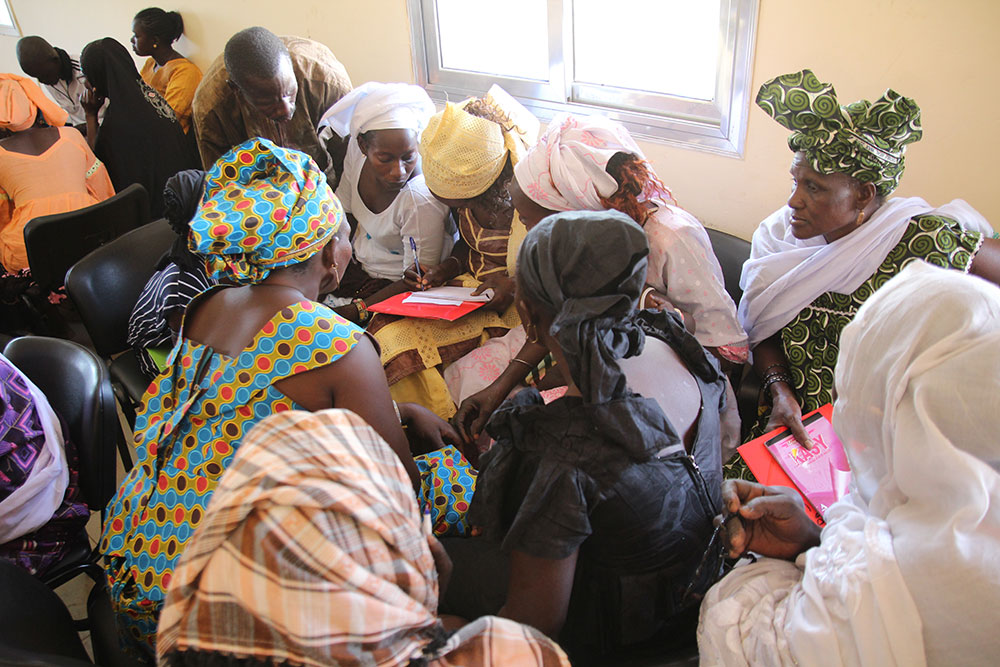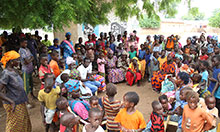SPRING/Senegal recognizes the importance of hygiene in households, schools, and health centers as a key element of its multi-sectoral approach to improving the nutritional status of pregnant and lactating women and children under the age of two. SPRING aims to increase awareness of good hygiene practices and influence the behavior of community members in its intervention areas.
SPRING organizes community mobilization activities to promote improved hygiene behaviors, in particular handwashing and the use of tippy-taps. Tippy-taps are simple, water-saving handwashing stations that increase the availability of clean water for handwashing at significant points around the household, including near latrines and kitchens, and at the entrances to household gardens, chicken coops, or sheep pens. Community mobilization events are held in primary schools, Koranic schools, health huts, and health posts across four departments in SPRING/Senegal’s intervention areas. In addition to demonstrating how to construct and use tippy-taps, the activities raise awareness of the links between general hygiene and nutrition and health. Community radio station partners cover these events and broadcast them to spread the message even further.

To support the uptake of good practices, SPRING supports the creation of hygiene monitoring units (HMU), which regularly monitor the hygiene practices within their communities. The HMUs consist of 6-10 highly engaged and influential community members, often community health workers, village heads, local government unit (LGU) representatives, and Koranic school teachers who have taken up the responsibility of being resource points for hygiene best practices within their communities. SPRING/Senegal conducts workshops for the HMU members, providing instruction on the critical moments of handwashing, the different steps to properly wash one’s hands, and the benefits of using a tippy-tap.
During a series of community mobilization events from November 29 to December 7, 2016, several members of SPRING/Senegal partner organizations Association pour la Promotion de la Femme Sénégalaise (APROFES) and Association Sénégalaise pour le Bien-Etre Familial (ASBEF) who attended the events volunteered to become members of HMUs in their communities. At the end of a SPRING hygiene workshop, each HMU finalized an action plan detailing how they would share what they had learned from the workshop with their community, either at weekly markets or other community gatherings. They also planned the logistics for household visits.
During household visits, each HMU records the number of households with functional tippy-taps, the number of people aware of at least three critical moments of handwashing with soap, and the number of households with drying racks, among other indicators. They will also provide support to households that have questions or are not following all guidelines.
Two women who attended the workshop from Thiare stated that they already were making home visits to inspect the hygiene in their community. They were grateful to SPRING for creating these hygiene monitoring units and giving them the direction and tools to continue doing the work in a more systemic manner.
SPRING’s activities in hygiene and sanitation rely on the collaboration with partners in the agricultural and health sectors, whose integration of hygiene activities in their work show an immediate impact in communities. In a recent workshop, one man shared the testimony of his family’s reaction to his attempt to feed his livestock with the family feeding dish. Because many of them had participated in one of SPRING’s WASH mobilization events, members of his community warned him of the risk that animal pathogens could cause his family members, especially the children under the age of two. He and other partners expressed their motivation to ensure that hygiene is prioritized in their communities. With newly trained HMUs in place to monitor compounds, schools, and health huts, these communities are now well-positioned to meet the highest hygiene standards.
